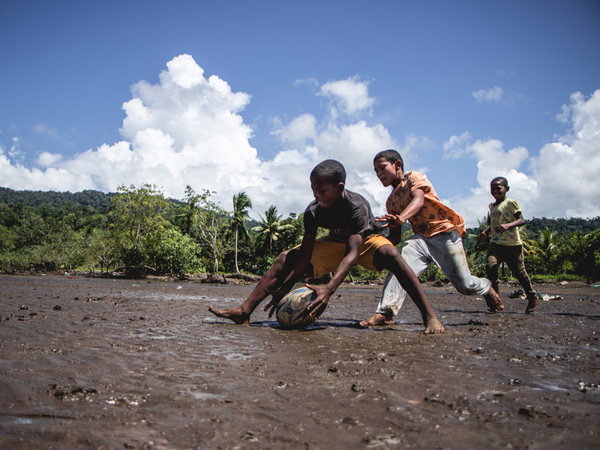Colombians come to the Clyde
13 June 2025

In late May, the sun shone brightly in Glasgow as we welcomed several of our Colombian colleagues to the SCIAF offices. Visiting were ‘River Guardians’ Bernardino Mosquera and Alexander Rodriguez, alongside staff from SIEMBRA, our partners specialising in environmental protection and law.
The ‘River Guardians’ are a group of 14 incredibly brave rights defenders who represent hundreds of thousands of people living in the poorest and most dangerous part of Colombia: Chocó. Together they speak up in defence of the River Atrato – and the communities that live along its 750km course.
 But why? Well, because the River Atrato is life for communities along its banks, but the life of the river, and their lives, are being threatened.
But why? Well, because the River Atrato is life for communities along its banks, but the life of the river, and their lives, are being threatened.
Bernadino told us:
“Right now, the river is like a sick person in the intensive care unit and if the river is ill, we also fall ill.”
Illegal gold mining diverts and poisons the water with mercury and cyanide, tearing down acres of rainforest in the process. Rubbish is dumped wantonly, creating piles of plastic that pollute the surroundings. And at night, paramilitary groups patrol the water, closing it off to communities as drugs and illicit contraband move under the cover of darkness.

For local people, the Atrato is central to their livelihoods – to meeting their basic needs. The river is essential for sanitation and growing food; it's also used for transport and recreation. The river holds key cultural significance too. It is the foundation, the backdrop, of their music and dance, legends and stories, all of which are passed down from generation to generation.
The Colombian visit to Scotland was all about learning. SCIAF and the University of Glasgow learnt from the Colombians, and vice versa. It was part of a wider tour in the UK, Ireland and Europe drawing attention to everything the Guardians have achieved.

This is particularly timely as a project “Who Owns the Clyde?” has just begun here in Scotland, spearheaded by crime writer Louise Welsh, Professor of Creative Writing at Glasgow University. She’s started a campaign seeking to rejuvenate areas either side of the Clyde and inspire local people to look after and engage with their river.
The ‘River Guardians’ are pioneers of this type of work – over the past 10 years, we have been at their side as they’ve petitioned and advocated that the River Atrato receive legal ‘personhood’. This was granted in a special ruling in 2016 – and we continue to work with them to ensure the ruling is upheld.
 But what does it really mean for a river to have legal personhood? In essence, it gives local communities a powerful voice in the river's future. It means they can speak out against harmful activities, raise concerns about threats to the river’s health, and do so through the River Guardians – a dedicated body that amplifies their voices. Ultimately, it ensures that those who damage the river can be held accountable under the full force of the law.
But what does it really mean for a river to have legal personhood? In essence, it gives local communities a powerful voice in the river's future. It means they can speak out against harmful activities, raise concerns about threats to the river’s health, and do so through the River Guardians – a dedicated body that amplifies their voices. Ultimately, it ensures that those who damage the river can be held accountable under the full force of the law.
Dr Geraldine Hill, Colombia Officer for SCIAF said:
“This visit allowed us to learn more about how the River Guardian’s ancestral knowledge is so important to maintaining and preserving the river – and about how they see justice for people as intricately linked to justice for the river.
“Along with our partners at SIEMBRA and colleagues at the University of Glasgow, we will continue to shout about how much the Atrato River experience can inform other initiatives linking justice for people to justice for nature.”

We’re working with the University of Glasgow to help communities gain legal rights and full access to their ancestral territories.

In Colombia, we focus on promoting peace, helping people to preserve their land, protect their rights, and protect themselves from threats.

We’ve been working with SIEMBRA on a range of environmental, peacebuilding and indigenous rights projects.